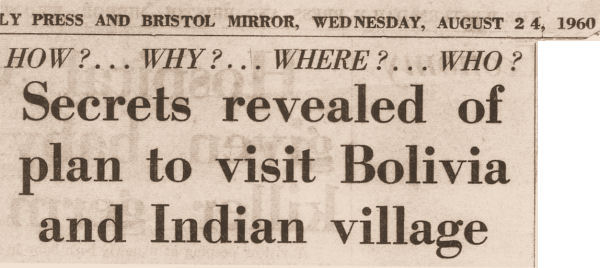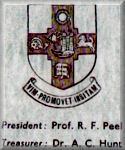University
of Bristol Trans-Continental Expedition 1960 — 61 | ||||||||
| ||||||||
More than one Reason For more than one reason "six of one and half a dozen of the other" could be the motto of the University of Bristol Expeditions Society Trans-Continental expedition (1960-61), which will leave Bristol next week. In the material sense, the sixes and half-dozens of equipment, stores and personal baggage are making a mountainous heap (surely too much for our two vehicles?), and metaphorically speaking we often find ourselves tending to edge between alternative explanations for the reasons of our project. This must not be taken as an indication of an apologetic attitude. The whole trouble is that the expedition has almost as many reasons for its existenance as the individual members have reasons for being with it. Scientific observation? Adventure? Curiosity? Commercial inquiry? A little of everything. Questions about the reasons for our expedition generally follow certain definite paths. They run something like this - Why? Where? Who? How? What? Or more fully, Why are you going in the first place? Where do you hope to get to? Who is in the party? How on earth did you manage to find the necessary money? (Once it was "How do you expect to find the money?"!). What do you hope to achieve? Fascinating This is a catechism with which we are becoming familiar, but it would be inaccurate to say that we objected, since we ask nothing better than the chance to bore people with our plans - I hesitate to imagine what we will be like on our return, when we really have something to tell! But the organisation of a venture such as this has its own fascination if sometimes a perverse one, and one can learn almost as much from the preliminaries as from the journey itself. In particular, we have discovered a good deal about the way things work in our own country, and this should be considered an essential before venturing abroad, presumably to observe, compare and even criticise in the casual way that travellers have. "Why are we going?" One of our advisers (at the Medical Research Council) said, baldly, that the desire to make an expedition always came first, the reasons afterwards. Curiosity mainly, I suppose. Informed curiosity, we hope. After spending three or more years herded into lecture rooms, or crouched, however unwillingly, over text-books, it is natural to wish to see what these theories or hypotheses mean in terms of the world itself. Our darker thoughts have often insinuated that they are hardly related to life at all; this will be our chance to find out. Very different
As the time of departure gets nearer, the operative word becomes "tropical." Many arms are sore from injections, and most hearts are a little tremulous at the thought of an un-English animal and insectlife - in fact "scorpion," "snake," "spider" and such have almost become swearwords among us. But these two regions of study are on opposite sides of the world, in a manner of speaking, thus the journeying between them takes us all the way round - overland to India (driving our own vehicles and sleeping in tents), by boat to Peru (calling at Singapore, Freemantle, Sydney and Wellington), into Bolivia, then up through Central America, the west coast of the United States, across Canada and back home over the Atlantic. The journey is 30,000 miles on land and another 16,000 over water. It will take 14 months to complete. The party "Who is in the party?" The whole affair is sponsored by the University of Bristol Expeditions Society. The team consist of six graduates - a geographer, an economist, a doctor, a zoologist/photographer, a recording engineer/cameraman and a writer. But no one gets off as lightly as that; there is more than one job each. These work out quite easily; the writer is P.R.O. the recording engineer is the mechanic, the zooloist will drive off the snakes, the geographer looks after the routes, the economist will look after the money and the doctor will look after us. Everyone is his own housemaid; the cook has yet to be appointed. We think this is an unusually well balanced team, and should the lure of tropic nights pale, there seems to be no limit to what we might teach each other. Indeed we should learn more in the coming 14 months than in any number of university courses. Assistance "How on earth did we manage to find the necessary money?" Well, of course, we didn't. Much of the expedition is arranged in kind: We have received a great deal of assistance in the way of equipment and stores. In some cases, test reports will be prepared showing the performance of the articles under the extremely varied usages that will be encountered (such as sheepskin jackets in the Persian desert or the ability of pens to write over 12,000 feet) But most of the goods we take with us are of standard type, so most of the gifts and loans are prompted by generosity rather than commercial research. Without help of this kind, it would not be possible to organise this type of expedition, or indeed, any large-scale unorthodox undertaking - such as single-handed boat races or long-distance marches. Those of us who take advantage of this altruistic assistance can repay only by thinking well and speaking well of the products and by continuing our patronage when the commercial arrangement is one of purchase, not loan or gift! £4,500 in cash But many of the items need to be paid for in hard cash and we have received donations of approximately £4,500, in addition to the money contributed by members of the team. People in influential positions also have interested themselves on our behalf and greatly to our advantage. Of course, it sounds very simple when a recital is made of the successes, but there were very many failures, perhaps a ratio of ten to one, and days when what had once seemed reasonable expectation began to look more like hysterical optimism, and the press cuttings describing our probable success gazed reproachfully down at us from the walls of the office. But this, the first expedition from Bristol has not gone the same way as do many student ventures; it is well founded and supported, for which we are indeed grateful, and its success now depends upon our powers of organisation. Tearing rush This is a subject on which no one saw fit to instruct us at the university. It is made more difficult by the attitude of those with whome one must deal. Undoubtedly our transactions are sometimes a little tardy and hurried (in spite of 15 months of preparations). In fact much of our negotiation is being conducted in a tearing rush. For example, it was a very worried P.R.O. who flew to Rotterdam to plead with the owners of the only ship could posssible link our land routes. The MV Willem Ruys would cross the Indian and Pacific oceans at the right time and was reputedly full. This 20th century desperate ride was fortunately successful. But there are times when no amount of brisk and businesslike negotiation can persuade the cautious administrator to curtail his normal working methods, that is five days' consideration before he will put his signature to a document. So too much time is spent locked out of some embassy due to a misunderstanding of international situations, or seething frustratedly in an anteroom awaiting a great man's pleasure. Time is our chief currency, to waste it is to be spendthrift; to use it for one's own purposes almost becomes embezzlement. Objectives "What do you hope to achieve?" Well, our friend at the Medical Research Council also thought that to bring back one hitherto unrealised fact would make such a venture worthwhile. We hope to make up in concentration what we lack in experience. Thus we will spend three months in n Indian village and five months in Bolivia. The main points of our observations will be the changing village economy in the fact of the attempts to apply modern methods, how much success these plans are having, and what is the effect on the traditional lives of the people. We hope to reproduce our observations accurately and vividly on film - cine, for television and popular education, still photographs, for illustrations and lectures, and film strips for use in schools. By road After Bolivia we are merely coming home. We have chosen to do this by road through the Americans partly for our own interests and partly in order to fulfil our dual function. We shall be abroad as representatives of our country and our city, and are sure to be questioned about both. Hence we have designed our journey through the U.S. and Canada largely with the commercial aspirations of Bristol and the West of England in mind. We shall be carrying letters from the Lord Mayor to various municipalities en route, and shall visit as many as possible of the 23 townships and cities in America and Canada called Bristol. We
hope to find other things in common, not the name only, and I am sure we shall
do so. In the 20th century when we all live in each other's back gardens, people
like myself are often moved to philosophise on the duties of man. This I can spare
you since we all pay at least lip-service to the same ideals. Perhaps our journey
will show us how these ideals can be worked out. | ||||||||
|


